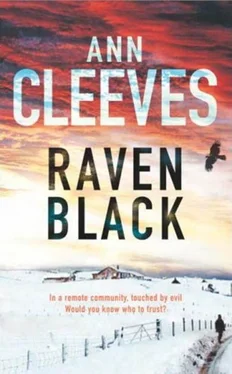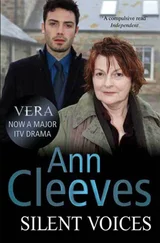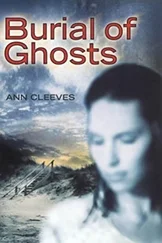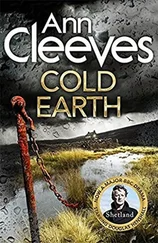They ran together into one wide, shallow lake. She splashed through it, thinking, Cassie would love this.
I don't think I can handle this on my own, she thought. It wasn't just the big things, like Catherine and her father.
There was other stuff she'd have liked to discuss with friends. Men, for instance. She missed having a man in her life, would have liked to have admitted that, joking, weighing up the possibilities. Here, it was impossible to talk about it. People wouldn't understand.
She missed even the trivial conversations about clothes, diet, holidays, the stuff she'd despised when it was a part of her life. She'd always thought of herself as an independent woman. Strong. Now, for the first time since moving back to Shetland she longed for the company of her women friends.
Here, she'd always be an outsider. Always. Cassie might grow up with a Shetland accent, marry a local man, but people would never forget that her mother was English. It would have been different if Fran had stayed married to Duncan. There would have been acceptance of a kind then. Now she couldn't see how it would work out.
Of course there were other incomers, expat English. Hundreds of them, like Euan and her, trying to forge a life for themselves in the islands. Some of them tried so hard to be local that they made themselves ludicrous, with their spinning lessons, their music and attempts at dialect.
She saw them gathered in the cafes and restaurants in town, in their elaborate Fair Isle cardigans and handspun woollen sweaters. She met them at the film club and the book festival. Other incomers preferred to keep themselves apart. For them Shetland was a temporary exile and soon they'd return to civilization with tales of the cold and the isolation. Both groups mixed mostly with their own kind. She couldn't see herself fitting in with either of them. So, is this how it'll end? she thought. I'll become pathetic, lonely and middle-aged, living only through my art.
But already the exercise was lifting her mood. There was a childish pleasure in kicking out at the water as she walked through it. The last thought was self-mocking. And what was wrong, after all, with living through her art?
She began climbing the hill, following a drystone wall. She'd never been this far before. Usually on walks she had Cassie with her and the girl couldn't walk at this pace. She grizzled and whinged to return as soon as they were out of the house. Here, high on the moor, the effect of the rain and the melted snow was more dramatic. It ran in waterfalls down gullies in the rock and through the peat, picking up the soil and shale, scouring out a path down the hillside. It would take only one heavy rainstorm to cause more severe landslides.
She'd heard Alex Henry talk about it on the radio. Part of the problem was overgrazing, he'd said. There were just too many sheep, loosening the root structure of the grass, pulling away the fabric of the land. It was a good thing the system of subsidies would change and there'd no longer be a payment for every animal. She'd thought it had been a brave thing to say. It wouldn't make him friends among the farmers. He was a local and perhaps he was more isolated than she was. She'd heard the parents muttering about him in the school playground and wondered if he had any real friends at all.
The dog had run on, unaffected by the gradient. Now she stopped and was barking. Fran called to her, but she refused to return. Fran followed her across the hill, sliding occasionally where the ground was bare and muddy.
Maggie was at the top of a steep peat bank. The rain seemed to have loosened a pile of rocks and boulders exposing the black peat below. The dog was scrabbling into the debris. Fran called her again. She turned, but still she didn't move. The sun came out from behind thin cloud and shone more brightly than it had all day. It was low against the hill now and the light seemed unnatural, sulphurous. The dog and the boulders and the hillside seemed hard-edged, drawn by a heavy hand.
Breathing heavily, Fran reached the dog. She began swearing at her and told her she'd never wanted her in the first place. Then she stopped and caught hold of her collar and pulled her away. There was something under the pile of rock. A shoe. The leather was discoloured and the buckle was tarnished. It was a child's shoe. The dog was going crazy, barking and jumping, and Fran thought she would strangle herself. She was still trying to keep hold of the collar. There were a few tatters of clothing. Yellow cotton. And then the waxy outline of a small foot, pale against the black, fibrous peat.
Perez's mobile rang when he was on the landline to his mother. He'd just got in from talking to Alex Henry and decided he couldn't put it off any longer. He didn't know what he'd say to her, but she deserved a call. He poured himself a beer and dialled the number.
'Well?' she said, not asking first about the case, though she must surely know all about it, at least have heard about it on Radio Shetland. 'What about Skerry? Have you decided?' Her voice was calm. She wouldn't want to put him under pressure, but he could sense her excitement. More than anything she wanted him back at home. Perhaps she wanted that even more than grandchildren.
If she'd asked first about the case, if she'd realized how important his work was, not only to him but to the victims' families, he would have responded differently. But he felt a stab of resentment because her world was so restricted. Its limits were the edge of an island three miles long and two miles wide – the North Light and the South Light, Sheep Craig and Malcolm's Head. So when the mobile rang and he saw Fran Hunter's number come up on the display, he said, 'Look I'm sorry Mum, that call's urgent. Something to do with the Ross case. You can imagine what it's like here. Manic. I'll have to take it!
'Of course,' she said, contrite, because she could imagine it. 'I'm sorry. I know you've other things to think of!
'I'll ring you back. This evening if I can make it.' Already he regretted being so abrupt. 'We'll talk about it then!
'There's someone else interested,' she said quickly, fitting the words in, while his mobile played its ludicrous tune in the background. 'In Skerry. Willie's grandson. The one who went away to agricultural college. He wants to come home! Then she put down the phone. She took a starring role in the panto every Christmas. She knew how to do dramatic endings.
'Hello!'
Automatically he'd pressed the answer button and he could hear Fran Hunter, but his mind was elsewhere and it took a couple of seconds of her shouting Hello, hello, like a passenger on a train as it hits a tunnel, before he answered her.
'I've found the other girl,' she said, when she realized he could hear her. The words came singly. They dropped one by one into his ear, pebbles thrown from a cliff into water. I've / found / the / other / girl. By then he was sufficiently aware of how serious this must be, he could tell by the dull flat tone of her voice, so he didn't have to ask her what she meant.
Perez found her on the road outside her house, looking out for him. She'd shut the dog inside and she was jumping up at the window. It was almost dark. There was just a light grey strip above the horizon to the west.
‘I’ll take you up’ she said.’ It’ll take you ages to find it on your own’
He thought she looked like a child herself, huddled inside her jacket, the hood pulled right down over her forehead and zipped up over her chin, so all he could see were the eyes.
'I have to wait for a colleague! He'd left a message at the hotel for Roy Taylor. His phone had been engaged.
Perez knew his life wouldn't be worth living if he went on without the English detective. 'He'll not be long!
Читать дальше












